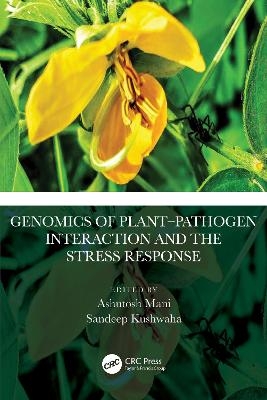
Genomics of Plant–Pathogen Interaction and the Stress Response
CRC Press (Verlag)
978-0-367-72108-4 (ISBN)
Plants are an indispensable part of human and animal lives for nutrition and health. But pests, diseases and abiotic stress adversely affect crop yield, which ultimately places significant pressure on society to provide food to an increasing population. Moreover, it also encourages increased chemical/pesticide usage on crops, which we see in the biomagnification of toxic and hazardous compounds polluting water bodies, soil and the environment. This condition will continue to worsen in the future due to the resistance-acquiring ability of pathogens against plant defense and chemical treatments. In addition, environmental disturbances and consumer health issues are being reported more promptly than before due to intensive use of pesticides in food production. Plant diseases affect our daily lives, as the use of insecticides and pesticides has become part of our food chain. As a result, precise disease diagnosis and management is crucial in order to avoid huge losses in plant production and related commodities. Accurate detection, precise diagnosis and proper management can play a significant role in keeping plants free from pathogens. In this book, scientists, researchers and scholars share their research knowledge, offering a valuable resource for understanding plant diseases, pathogen interaction and responses to stress through an omics perspective, contributing to further advancements in the field
Diseases in plants may be caused by various factors, such as viruses, bacteria, fungi and abiotic stress. Disease causes low crop yield, production of poor-quality fruits and grains, and deficiency of nutrients, which have a direct impact on human and animal health. A genomics-based approach can be applied to disease diagnosis; disease outbreak; evolution of plant and pathogen genome for disease outbreak in relation to climate change; and development of long-term strategies for plant health and defense. This book presents an overview of omics technologies and approaches used to understand:
the relation between plants and their environment in terms of diseases
responses to abiotic stress
the genomics of plant–pathogen interaction
herbicide-resistance mechanisms
the epigenetics of plant–pathogen interaction
gene regulation during abiotic stress response
the oxidative stress response
Dr Ashutosh Mani holds an MSc and PhD in Bioinformatics from the University of Allahabad, India. He worked as a MIUR fellow at the University of Cagliari, Italy, and is currently an assistant professor at Motilal Nehru National Institute of Technology Allahabad, India. He has more than ten years of teaching and research experience in molecular and structural biology, genomics and computational biology. His areas of interest include herbal drug discovery against Alzheimer's disease and diabetes and plant stress tolerance. Dr Mani has published more than 50 articles in national and international journals of repute. He has supervised 5 PhD, 10 MTech and 23 BTech Students. He has completed four sponsored research projects and has received research grants from funding agencies such as DST, SERB, ICMR and DBT. Dr Sandeep Kushwaha started his research career as a doctoral student at the Department of Bioinformatics, Maulana Azad National Institute of Technology, Bhopal. During his stay at Lund University and the Swedish University of Agricultural Sciences, he worked on more than ten major scientific projects in plant and soil science, elucidating molecular and genetic mechanisms and plant interaction using omics data and bioinformatics tools and techniques. He works as Scientist-E at the National Institute of Animal Biotechnology, Hyderabad, India. He has completed various research projects, published research articles in the public domain, and taught various higher education courses in India as well as abroad.
Chapter 1: Integrative Omics: Trends and Scope for Agriculture
Chapter 2: An Overview of Plant–Pathogen Genome Databases and Interaction Resources
Chapter 3: Exploring the Herbicide Resistance Mechanisms in Weeds Using Omics Technologies
Chapter 4: Impact of Genomics in Improvement of Rice Bean Production and Productivity: An Orphan Crop
Chapter 5: Omics Technologies Unravelling the Plant–Pathogen Interaction and Stress Response
Chapter 6: Meta-Analysis of Arabidopsis thaliana Gene Expression Data Identifies Heavy Metal Stress Responsive Genes
Chapter 7: Impact of Genomics Tools and Techniques in Crop Improvement
Chapter 8: Epigenetic Response During Plant–Pathogenic Interaction: An Overview
Chapter 9: Gene Regulation for Drought, Cold, Heavy Metal and Environmental Responses
Chapter 10: Role of Oxidative Stress-Responsive Thioredoxins in Biotic and Abiotic Stress Responses in Plants
| Erscheinungsdatum | 28.09.2023 |
|---|---|
| Zusatzinfo | 19 Tables, black and white; 8 Line drawings, color; 19 Line drawings, black and white; 8 Illustrations, color; 19 Illustrations, black and white |
| Verlagsort | London |
| Sprache | englisch |
| Maße | 152 x 229 mm |
| Gewicht | 570 g |
| Themenwelt | Naturwissenschaften ► Biologie ► Botanik |
| Weitere Fachgebiete ► Land- / Forstwirtschaft / Fischerei | |
| ISBN-10 | 0-367-72108-2 / 0367721082 |
| ISBN-13 | 978-0-367-72108-4 / 9780367721084 |
| Zustand | Neuware |
| Informationen gemäß Produktsicherheitsverordnung (GPSR) | |
| Haben Sie eine Frage zum Produkt? |
aus dem Bereich


